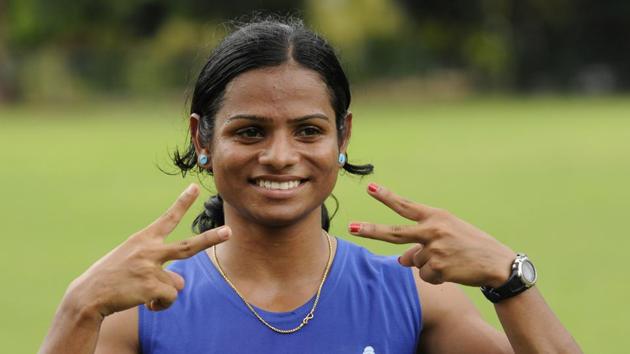Relief for Dutee Chand following IAAF’s new hyperandrogenism rule
Dutee Chand expressed relief at the new International Association of Athletics Federation (IAAF) hyperandrogenism rule which excludes the 100m and 200m events which the Indian sprinter participates in
Sprinter Dutee Chand heaved a sigh of relief as the International Association of Athletics Federation (IAAF) introduced its new hyperandrogenism rule on Thursday. The new regulations cover events from 400m to 1500m, excluding the 100m and 200m events which Dutee participates in.

“The IAAF this week issued new Eligibility Regulations for Female Classification (Athlete with Differences of Sexual Development) for events from 400m to the mile, including 400m, hurdles races, 800m, 1500m, one mile races and combined events over the same distances (‘Restricted Events’),” IAAF said in a statement on Thursday.
While the new regulations, which come into effect from November 1, have laid down the criteria for athletes with a ‘Difference of Sexual Development (DSD)’ to be eligible to compete in international events, Dutee will be out of the purview.
“If you can’t walk on the right side then we assume we can walk on the left side,” Dutee’s coach N Ramesh said on the exclusion of 100m and 200m from the new IAAF regulations.
“It is a big relief for Dutee. There was always this sword hanging over her. She is quite happy about the outcome,” Ramesh added.
“Now that there is some clarity on the issue, she will be able to focus completely on training,” said Ramesh who has been coaching Dutee in Hyderabad.
It has been a long battle for Dutee who was barred from competing in 2014 because of her levels of testosterone that exceeded the guidelines laid down for female athletes. High levels of male hormone testosterone, which is naturally produced in a female body, is understood to give them significant competitive edge.
A determined Dutee, however, decided to fight it out against IAAF’s hyperandrogenism clause in the Court of Arbitration for Sport, based in Switzerland.
The CAS ruling of 2015 suspending the IAAF policy for two years and asking it to draft revised regulations, came as a momentary relief for Dutee as it allowed her to compete in international events.
In September 2017, the IAAF submitted a revised draft but Dutee made a fresh appeal saying it is not based on detailed evidence, as was asked by CAS.
The CAS further suspended IAAF’s hyperandrogenism regulations for six months and asked it to come out with more scientific data in support of their policy.
IAAF said the latest research they have undertaken and data compiled show that there is a performance advantage in female athletes with DSD over the track distances covered by this rule.
“The revised rules are not about cheating, no athlete with a DSD has cheated, they are about levelling the playing field to ensure fair and meaningful competition in the sport of athletics where success is determined by talent, dedication and hard work rather than other contributing factors,” said IAAF chief Sebastian Coe.
However, the likes of Caster Semenya, who competes in 800m and 1500m, will be impacted by the new regulations. It could prevent the double Olympic and triple world champion from competing in 2019 World Championships.
As per the new criteria, athletes with a Difference of Sexual Development (DSD) “must be recognised at law either as female or as intersex (or equivalent); must reduce her blood testosterone level to below five (5) nanomoles per litre for a continuous period of at least six months (e.g., by use of hormonal contraceptives); thereafter she must maintain her blood testosterone level below five (5) nmol/L continuously.”
Semenya, who too has been fighting the hyperandrogenism regulations, was unperturbed.







